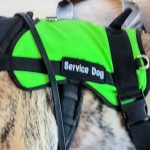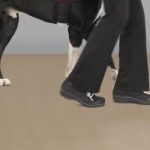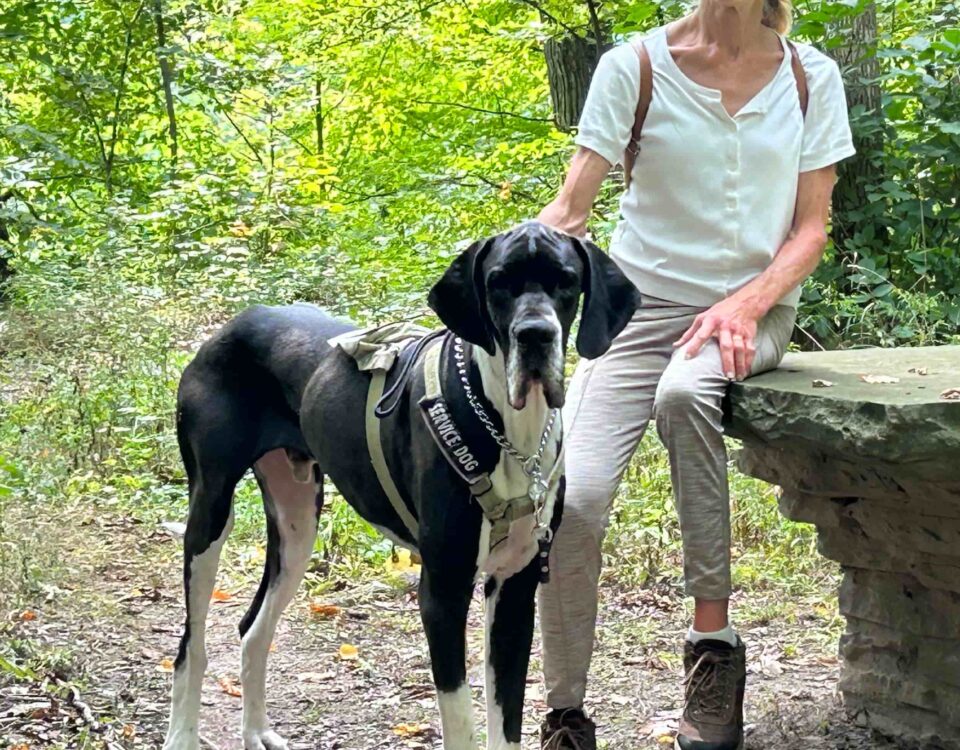
Snowvasana
February 15, 2019
Inhale and Hold for Five
May 9, 2019How businesses like the local coffee shop can help reduce service dog fraud

I’m seated at Starbucks with my chai latte (almond milk) grande, scone, extra napkins. My service dog, curled up on his mat beside me, sighs. We’re content in our corner, which has me wondering how it got so complicated.
Not the tea. Green or black, with bagel or brioche, the simple fact is that it is pleasant here. No surprises. Just what this customer wants.
An untrained dog running amok would cancel out the pleasantries. Like the diners in a California bistro recently, I’d find another establishment for my tea break. The dog in the booth beside those diners lounged on the seat until a plate of fries arrived, which he then snarfed off the table.
I’d also be among the no-repeat customers in a building in Massachusetts where, while on the elevator, a vested mini-dog leapt from a purse and attached its teeth to the snout of a legitimate guide dog. And certainly no one at a Florida playhouse will be eager to purchase tickets for next season. Throughout the performance, two “service” dogs paced and barked while a third humped any human leg that ventured into the aisle.
It would be no surprise to learn that these dogs (vest or sans vest) are bad for business. So, simply put: Why aren’t business stepping up to get them out? Federal law states that they can.

The Americans with Disabilities Act (ADA) is the federal law designed to provide a disabled person equal access to public places. It also acknowledges the rights of the owners and operators of said public places.
The law is actually quite simple and the three key terms are much easier to remember than the assorted drink sizes here in the coffee shop:
Click here for the ADA regulations regarding service dogs https://www.ada.gov/
Dog
Any establishment open to the public is open to a disabled person with a service dog (note: dog –there are no service snakes, turkeys, turtles, cats, peacocks). Simple. Service animals (remember: dogs) are partnered with disabled people. Staff can legally say to the customer with the pet rhino that the human is welcome there but Mr. Rhino must go.
See more here regarding definitions, which also include miniature horses https://www.ada.gov/service_animals_2010.htm
Disability
Stubbed toe, lonely since the kids left, or Fluffy will chew the sofa if left alone: These are excuses, not disabilities.
How is an employee to know the difference? Here is where it gets all twisted, like the leash of a crazed dog circling a tree. Twenty-three states (plus two with pending legislation) have tried to step in and help. They’ve passed laws making it illegal to falsely represent a service dog.

My tea has gone cold and I shudder at the very idea that someone would fake a disability. I wonder, do these service-dog-access wannabes decide they’ll be blind for every outing with their pet? Or, do they switch it up for variety: I choose to have Parkinson’s today, yesterday was Cerebral Palsy and I’m getting bored with that one.
But getting Fluffy into a public place where pets aren’t permitted takes more than dressing up the dog. By definition, the person is also passing himself off falsely as disabled.
Faking a disability to get a handicapped parking permit is disturbing enough. This is bigger: Our dogs are bred and raised train temperament and spend two-plus years training to be the the eyes, ears, legs that get us to the café, onto the elevator or into the theater.
Again, how is the server or cashier supposed to determine if the person with a dog in a vest is truly disabled? The ADA protects the rights of the disabled by not allowing businesses to delve into privacy. Employees aren’t permitted to ask prying questions or to see official paperwork. The flip side is that the fraud’s privacy is protected, too.
So, as complicated as the fraudulence has become, from the business-owner’s standpoint, it’s still quite simple: If the animal is a dog and the human says it’s a service dog that they need for their disability, staff must let them into the establishment.
Control
Forget about trying to determine if the dog in the vest belongs to a disabled person. Instead, simply pay attention to the dog’s behavior. If the dog isn’t under control, the federal law – the ADA – states that staff can ask them to leave.
Under the ADA, service animals must be harnessed, leashed, or tethered . . . the individual must maintain control of the animal through voice, signal, or other effective controls.
A person with a disability cannot be asked to remove his service animal from the premises unless: (1) the dog is out of control and the handler does not take effective action to control it or (2) the dog is not housebroken. When there is a legitimate reason to ask that a service animal be removed, staff must offer the person with the disability the opportunity to obtain goods or services without the animal’s presence.^
Any establishment open to the public is open to ask patrons to leave if the patron (abled or disabled) is harming others in the business or the business itself. Examples:
- Patron peeing on the floor may be asked to move off the premises.
- Dog peeing on the floor, owner may be asked to remove dog.
- Patron shouting incessantly, snarling or snatching food, items or an extended sniff may be asked to leave.
- Ditto with a dog.
- For more information and FAQs, see https://www.ada.gov/archive/qasrvc.htm
No need to prove if the human is devoid of any humanity by faking a disability. Vest or no vest, the federal law says that the dogs that are clearly disruptive should not be at cafes or theaters.
So it really is quite simple for any business: Get the disruptive dogs out.
As I finish my scone and collect up my things, I give my dog the signal to help me up so we can go. I wonder how simple it could be if businesses knew this information.

Even if Starbucks alone initiated by stepping in to get the disruptive dogs out – even if only in those 23 states – that would be 9, 467 coffee shops with 166, 430 pairs of employee’s eyes on the watch, sending disruptive pet Fluffys home.
Simple, really. And good for business.
See here for Starbucks statistics: https://spoonuniversity.com/lifestyle/the-number-of-starbucks-in-every-state



